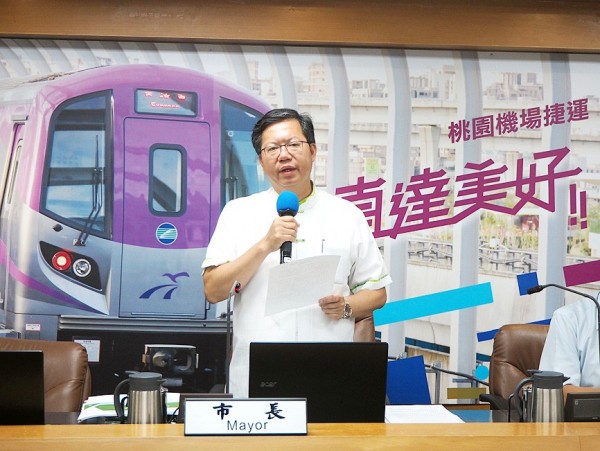《TAIPEI TIMES》 Council of Agriculture denies toxic rice sales

Taoyuan Mayor Cheng Wen-tsan yesterday talks at a municipal affairs meeting about the city’s handling of rice contamination in the Shenmei Pond area. Photo: Chen Yun, Taipei Times
FAKE NEWS? The council rejected a report by ‘Next Magazine’ that rice from a field irrigated by a pond polluted by heavy metals is being sold to consumers
By Chen Yun, Hsieh Wu-hsiung and Jonathan Chin / Staff reporters, with staff writer
The Council of Agriculture yesterday disputed a media report alleging that toxic rice from Taoyuan has entered the market.
A report in the latest issue of the Chinese-language Next Magazine said that rice from a field irrigated by Shenmei Pond (滲眉埤) — polluted by heavy metals from Yu Hung Technology Co’s (宇鴻科技) now-shuttered waste incinerator — is being sold to consumers.
The pond was polluted by a defunct incinerator and other factories, and the council forbade cultivation of 15.95 hectares of farmland in Lujhu (蘆竹) and Tayuan (大園) districts, it said.
However, the ban does not apply to the 3 hectares near the incinerator that Next Magazine said was growing unsafe rice, because it is not irrigated by water from the affected pond, the council said.
An inspection confirmed that the field relies on a water from a different source, it said.
Next Magazine took water samples near the incinerator, but the field in question does not use water from that source, Taoyuan Department of Environmental Protection’s Water and Soil Quality Protection section chief Yeh Meng-fen (葉孟芬) said, adding that since the ban was issued no rice has been grown in the affected fields, which are inspected every two months.
Fields that are cleared for agricultural use are inspected every three to five years, she added.
Copper was the highest-level pollutant in the pond and cadmium was also detected, Yeh said.
The department has sampled soil from the fields for testing and local agricultural offices are to test its crops after harvest to assure the public, she said.
Landowners whose fields are covered by the cultivation ban have no incentive to grow rice illegally and they are not known to do so, Guolin Borough Warden Chen Hsi-ta (陳錫達) said.
A NT$90,000 subsidy was paid to farmers forbidden to cultivate their polluted land and growing rice in those fields is punishable by a fine, he said.
It makes no sense for farmers take such risks, he said.
The council said that trace amounts of copper are important to health and it is not included as a forbidden element in its crop regulations, which is concerned with mercury, lead and cadmium.
The maximum amount of those metals in rice is 0.05 parts per million for mercury, 0.4 parts per million for lead and 0.2 parts per million for cadmium, it said.
Linkou Chang Gung Memorial Hospital nephrologist Yen Tzung-hai (顏宗海) said some copper is necessary for health and it occurs naturally in liver, seafood and chocolate.
The recommended daily copper intake is 0.9 milligrams and it should not exceed 10mg; excessive copper intake can impede liver function with cirrhosis being a possible side effect, Yen said.
新聞來源:TAIPEI TIMES
















